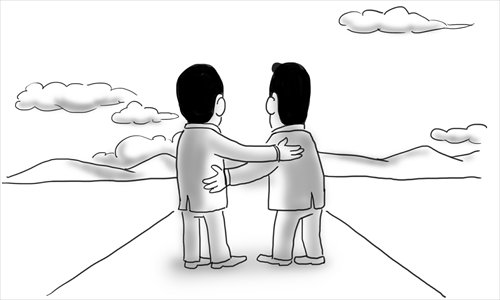Hanoi’s new leaders will stick to old policies

Illustration: Liu Rui/GT
After Vietnam's parliament approved three new deputy prime ministers and 18 other cabinet members on Saturday, the nation has wrapped up its leadership transition. The new administration will be led by General Secretary of Vietnam's Communist Party Nguyen Phu Trong, who has been re-elected for a second term, as well as new faces such as Tran Dai Quang, the new president, Nguyen Thi Kim Ngan, the country's first parliament chairwoman, Nguyen Xuan Phuc, the prime minister.
Media tend to use "conservative," "reformist," "pro-China," or "pro-US" to label Vietnam's leaders. This is no more than a way to sensationalize the cliquism of Vietnamese politics.
As far as I am concerned, the country's leaders' political views are not that different. Generally speaking, they are all vigorous reformists, only that some might behave a bit aggressively, while others choose to play it safe. Yet they have one thing in common, which is a desire for political stability and economic development.
In face of Beijing and Washington, the Vietnamese leadership do not employ a cookie cutter approach. All they do is to deal with different problems while depending on different situations. Every single choice - cozying up to China or becoming increasingly dependent on the US - is made on the basis of Vietnam's national interests. The new government will stay on the same track.
Vietnam has a very explicit foreign policy, which is maintain friendly relations with all major powers including China, Russia and the US, while not completely swinging to any of them. The country wants diversity, multilateralism in its diplomacy, and in the meantime, it desires to keep its independence as well. That's why in each individual case, it can clearly differentiate the ones it can work with from the ones it should struggle against.
No matter how big the political reshuffle is this time, Vietnam's diplomatic policy will not be dramaticaly changed. Over the past decade, the policy has been quite successful. It has helped Hanoi ramp up its international status, accelerate the country's economic growth, and promote its influence. Meanwhile, the nation has also organized and hosted a number of international conferences, and raised certain influential initiatives that have received positive responses. Take the South China Sea issue, Vietnam has been utilizing international occasions to publicize its own assertion. Such an act has without doubt won itself a lot of sympathy.
Needless to say, the dispute over the South China Sea is currently the biggest challenge between Beijing and Hanoi. Both sides are quite antagonistic toward each other to protect their own sovereignty. Especially after the involvement of the US and Japan, Hanoi's policy on the water is severely affected. Being a small country itself, Vietnam can be easily influenced by major powers. Now that both Washington and Tokyo are making huge efforts to draw Hanoi over to their side, the latter will hence grow more reliant on the US and Japan.
However, Vietnam is also perfectly clear that China is of great importance to it. From the perspective of its geographical position, China is its giant neighbor. In terms of political systems, there is no need to explain Beijing's influence on Hanoi. Economically, China has been Vietnam's largest trading partner for 12 consecutive years. With the ongoing emergence of China, Vietnam will only become increasingly reliant on Beijing in the field of trade and economy. Moreover, Chinese Confucianism is also deeply rooted in Vietnam's culture.
That said, Hanoi will find no way to get rid of Beijing's influence no matter in what aspect. For example, if China refuses to release water from the Lantsang River, Vietnam will have to face severe drought during the current season. That's why recently, China has already discharged water to the downstream countries to alleviate drought in Vietnam, and this plays a significant role in the central and southern part of latter's agricultural industry.
There are indeed certain contradictions between the two sides, and it has proved to be very difficult to handle. But in any case, given China's significance to Vietnam, as well as the latter's own diplomacy, Vietnam's China policy will be unlikely to shift, and there will hardly be any major change in the bilateral ties.
The author is a research fellow of Vietnamese studies at Chinese Academy of Social Sciences. opinion@globaltimes.com.cn Follow us on Twitter @GTopinion